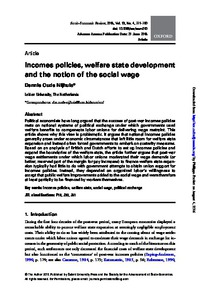Incomes policies, welfare state development and the notion of the social wage

2015
13
4
October
771-790
trade union attitude ; wage policy ; welfare state
Wages and wage payment systems
http://dx.doi.org/10.1093/ser/mwv010
English
Bibliogr.
"Political economists have long argued that the success of post-war incomes policies rests on national systems of political exchange under which governments used welfare benefits to compensate labor unions for delivering wage restraint. This article shows why this view is problematic. It argues that national incomes policies generally arose under economic circumstances that left little room for welfare state expansion and instead often forced governments to embark on austerity measures. Based on an analysis of British and Dutch efforts to set up incomes policies and expand the boundaries of the welfare state, the article further argues that post-war wage settlements under which labor unions moderated their wage demands (or better, reserved part of the margin for pay increases) to finance welfare state expansion typically had little to do with government attempts to obtain union support for incomes policies. Instead, they depended on organized labor's willingness to accept that public welfare improvements added to the social wage and were therefore at least partially to be financed by workers themselves."
Digital
The ETUI is co-funded by the European Union. Views and opinions expressed are however those of the author(s) only and do not necessarily reflect those of the European Union or the ETUI.